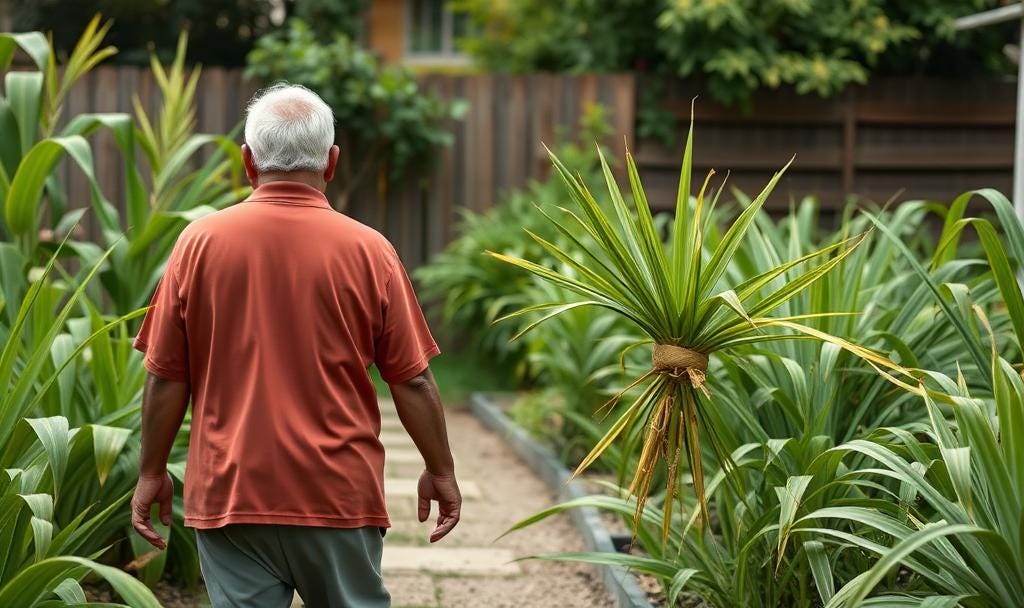Chewing Sugarcane with My Father (and Other Things I Can’t Let Go Of)
On love, loss, and the mercy of letting go
I have this dream that sneaks up on me some nights. My father and I are walking through the garden behind his old house, sunlight puddling on the leaves, the lawn perfectly manicured. He cuts a stalk of sugarcane, peels it with his pocketknife, and hands me a piece. We chew and talk. The air smells like wet soil and sweetness. We walk softly. Every now and then, I glance over to catch his eyes, to make sure he knows I’m listening. He turns every plant into a lesson, and every walk into a small pilgrimage.
It’s peaceful. So peaceful I almost don’t trust it. Because it wasn’t always like that. We did go on walks. He did hand me sugarcane. The earth did smell that sweet. But more often, I walked with a clenched fist. I was angry on the outside, afraid beneath it, hungry for something I couldn’t name.
I held tightly to a resentment I’ve since forgotten, a kind of confusion, a hunger for something he couldn’t give. I’ve come to learn it wasn’t his fault. Now that he’s gone, the fist has changed shape. I still feel it tightening, only now it’s grasping at the memory itself, afraid that if I open my hand, he’ll vanish. Or worse, maybe one of the other memories will seep in.
His anger, that look of disappointment. My chest still speeds up just thinking about it.
Or maybe something even less forgiving, what if my mind brings back the hospice days? The smell. The look on his face. His bald head. The weakness in his arms. Even then, a trace of sweetness and the faint scent of sugar on his breath, though he hadn’t eaten for days.
His touch was tender and fragile, like he was already halfway gone. I remember standing there, feeling hopeless, wishing I could bring him back, and knowing I couldn’t.
Prayer confused me then, but I remember praying anyway. I stood in the backyard, right next to that sugarcane, and said “What you must do, do it quickly.” I realize now that was more of a command than a prayer. I am grateful God complied.
I don’t think I can go back there again. I need those days to stay gone.
Meister Eckhart once wrote:
“Whatever we cling to, we make small. Whatever we let go, we let become infinite.”
If that’s true, then maybe my father and I are both still trapped in the garden.
A garden isn’t a bad place to linger, but love ripens only when we let it fall back to the earth.
The Polished Past
I can understand why we’d rather not see things as they are.
Psychologists call this idealization, the mind’s way of preserving attachment by editing memory. Studies show that after loss, we tend to remember relationships in gentler tones. It’s a kindness of the brain, a bias that keeps us feeling safe and still connected.
But it also keeps us stuck.
Each time I replay the sugarcane dream, I’m holding on to what was supposed to be rather than what was. Eckhart might say I’m turning memory into a possession, making it too small to contain God.
Maybe that is the deeper trouble. The impulse to possess, our need to hold people, stories, even the sacred itself, is the quietest enemy of the soul. What was meant to pass through, we keep trying to keep. Even the sacred. Especially the sacred.
Because we idealize more than our memories and more than people.
We idealize jobs, convincing ourselves that the one we left was the one that got away, forgetting the inbox dread and Sunday-night ache.
We idealize relationships, polishing the highlight reel while skipping the lonely silence in between.
And we idealize our own stories.
We script ourselves as the Christ of our personal gospels—the misunderstood savior, the one who sees clearly while everyone else plays the fool. But if we looked closer, we might realize our lives align more with the Pharisees who feared change, or the Roman soldiers trying to keep order or simply follow along.
Theologians call it spiritual inflation. Psychologists call it self-enhancement bias. Either way, it’s our refusal to admit we’re mixed creatures. We want purity more than paradox. And when the myth of perfection collapses, we swing to its opposite.
The Scum of the Earth Reflex
If I can’t be the saint, I’ll be the scum of the earth.
If I can’t be the healer, I’ll be the wound.
That’s my specialty. I can turn on myself faster than anyone I know.
Self-criticism feels like control. If I punish myself first, maybe I won’t be caught off guard again. But all it really does is deepen the despair.
Eckhart would say that’s another form of attachment, not to pleasure but to guilt.
We cling to self-hatred because at least it feels like something solid and justifiable.
Mercy, by contrast, feels like falling through air.
He once wrote, “Some people want to see God as they see a cow, for the milk and cheese they can get. But the soul that loves God for God’s sake lets God be God.”
Even if the word God doesn’t sit easily with us, the point still lands.
Most of us keep a clenched fist around whatever that word means, whether it is a Father, a mystery, or a story we can’t quite shake. We grip our definitions the way a child grips a toy, afraid that if we loosen our hold, the whole thing will disappear.
But maybe what vanishes isn’t God at all. Maybe it’s just the smallness of our idea.
Letting go is refusing both the hero story and the villain story.
It is unclenching the fist and allowing life, call it God, call it love, call it what you will, to be itself even in the mess.
The Body Remembers
Research on rumination and grief shows that idealized or vilified memories keep the nervous system in threat mode. The brain replays the loss as if it’s still happening. The body keeps releasing cortisol for a danger long gone.
Letting go isn’t erasing the past. It’s integrating it.
When we can name what happened without polishing or punishing it, the nervous system finally gets the message: we’re safe now.
Truth quiets the storm.
The Contemplative Way
Contemplative practice is the art of letting what arises, arise, and letting it pass.
This is Eckhart’s gelassenheit, his “letting-be.”
In silence, memories float up like bubbles in deep water.
We watch them shimmer and burst.
We stop gripping the garden, the job, the story, the identity.
Slowly, we trust that what falls away was never meant to stay.
And here’s the small miracle: the energy once trapped in grasping becomes compassion. I find myself softer with strangers, more patient with the people I once blamed. I’m more aware of the present moment and the fragility of relationships. The tenderness I kept for him begins to spill into everything else.
We begin to bless what once broke us, not because it was right, but because we’re finally free enough not to need it to be wrong.
Back to the Garden
I still dream of that garden. My father still peels the sugarcane, still hands me a piece.
Now, when I wake, I try not to hold him there. Sometimes my hand still closes before I even notice. Then I breathe and open it again. I let him go into the mystery that holds us both.
The sweetness is still real, even when it dissolves.
Maybe that’s what Eckhart meant:
letting go doesn’t end love. It makes it infinite.
And maybe Nouwen was right too. He wrote that as long as our hands are clenched, we cannot receive anything new.
So I open my hand. The sugarcane slips through.
The sweetness is finally free to dissolve into everything.
Closing Prayer Meditation
Here is a prayer I often turn to because it steadies my shaking hands.
Dear God,
I am so afraid to open my clenched fists!
Who will I be when I have nothing left to hold on to?
Who will I be when I stand before you with empty hands?
Please help me to gradually open my hands
and to discover that I am not what I own,
but what you want to give me.”―Henri J.M. Nouwen,The Only Necessary Thing: Living a Prayerful Life
These essays grow best in conversation. If it speaks to you, share it or subscribe so we can keep walking this garden together.
References (for readers who like footnotes with their gardens):
Boelen, P. A., & van den Bout, J. (2005). Complicated grief, depression, and anxiety as distinct postloss syndromes: A confirmatory factor analysis study. American Journal of Psychiatry, 162(11), 2175–2177. https://doi.org/10.1176/appi.ajp.162.11.2175
Eckhart, M. (1981). The complete mystical works of Meister Eckhart (M. O’C. Walshe, Trans.). Crossroad. (Original works 13th–14th centuries)
Fraley, R. C., & Shaver, P. R. (1998). Loss and bereavement: Attachment theory and recent controversies concerning “grief work.” In J. H. Harvey (Ed.), Perspectives on loss: Toward an integrative framework (pp. 277–300). Taylor & Francis.
Mikulincer, M., & Shaver, P. R. (2016). Attachment in adulthood: Structure, dynamics, and change (2nd ed.). Guilford Press.
Nolen-Hoeksema, S. (2000). The role of rumination in depressive disorders and mixed anxiety/depressive symptoms. Journal of Abnormal Psychology, 109(3), 504–511. https://doi.org/10.1037/0021-843X.109.3.504
Sedikides, C., & Gregg, A. P. (2008). Self-enhancement: Food for thought. Perspectives on Psychological Science, 3(2), 102–116. https://doi.org/10.1111/j.1745-6916.2008.00068.x




What a gift, thank you for sharing it!
Beautifully written. "Letting go isn't erasing the past. It's integrating it." Thank you for this wisdom.